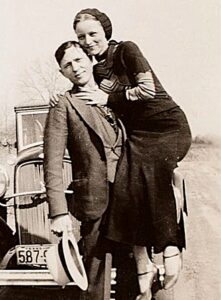Lately I have been reading a lot about the days of Bonnie and Clyde, and what we can learn from back then.
The country was a mess. This “Public Enemy Era” spanned from 1931 through 1935, during the depths of the Great Depression that crushed the economy, and the Dust Bowl – a period of severe dust storms that greatly damaged the agricultural output of the American and Canadian prairies – that caused mass hunger. 10,000 banks went out of business, taking $3 billion of depositor’s life savings with them, leaving account holders penniless. With 80% unemployment in some areas, those unfortunates would remain destitute, unless they took matters into their own hands, and some turned to crime.
Today, rampant government spending is out of control, leading to increasing inflation that steals buying power. We have some wealthy people, but as I travel around the U.S. – my latest trek a 1,081-mile drive from Decatur, Illinois to Worcester, Massachusetts, I’ve seen a lot of help-wanted signs; undocumented illegal aliens working for far less than minimum wage; obscenely-high gas prices; rental cars that have over 40,000 miles on them and are in constant need of maintenance yet sometimes costing $100 a day; and infrastructure problems (read bad roads, run-down bridges) that will remain poor, because these big spending programs always end up targeting pet projects of the rich and voting constituencies of the lazy.
For the first two years – 1931-1933 – it was a stupid era. Prohibition in the United States, beginning in 1920 and ending in 1933, was a nationwide constitutional ban on the production, importation, transportation, and sale of alcoholic beverages. While some people regarded the attack on alcohol as a noble cause, an overwhelming number did not, and Prohibition single-handedly caused tens of millions of Americans to view the law as lacking any moral obligation to follow it; they became felons overnight and they felt no remorse at doing so. This disregard for law and order became a cancer in society; one day citizens refused to follow Prohibition; the next they began to support organized crime to provide the illegal goods they wanted.
Today’s version of Prohibition aims at stripping Americans of their right to bear arms, another stupid idea. Were it to get close to happening, tens of millions of us – maybe more – will become felons overnight, because we will not comply, and organized crime will start a shipping tsunami of firearms into the country, just like it did booze.
For the first years of Bonnie and Clyde, most regular folks hated the police and were on the side of the renegades, even though they were a far cry from modern day Robin Hoods portrayed in movies. It was only after several murders of police, including one trooper on his first day of the job and another scheduled to be married in three weeks before he was cut down by Clyde in cold blood – the bride-to-be wore her wedding dress to her fiancée’s funeral – that attitudes toward the police changed.
Today, police are equally disrespected – mostly in big cities from Portland to Atlanta. I’d like to think that Champaign Police Department Officer Chris Oberheim didn’t die in vain, and it seems like many folks in central Illinois know that too, but this country is in a whole lot of trouble right now with its negative view of the “thin blue line”. What doesn’t help is when senior FBI personnel start helping one political party against another, though. That convinces many people that the law is unfairly enforced; today citizens may just mistrust high-level leaders of the FBI. Tomorrow that mistrust, which often evolves to not cooperating with career FBI agents, can lead to the bureau being ineffective. Lots of folks knew where Bonnie and Clyde were hiding out and operating, yet the stayed quiet.
There’s another takeaway from Bonnie and Clyde. In our era of concealed carry and the ubiquitous Glock-this and Glock-that, maybe we put too much emphasis on pistolcraft – not that we shouldn’t be proficient with these weapons. But Clyde Barrow didn’t terrorize people with a pistol; he did it with Browning Automatic Rifles, BARs, whose .30-06 rounds would go through one side of a car and out the other, killing anyone in between. And when the law finally did catch-up with Bonnie and Clyde one morning on a Louisiana dusty dirt road, what put finis to the two marauders were a couple of Remington Model 8s, a BAR, a Colt Monitor, and some Remington Model 11 semi-automatic 12-gauge “riot guns”.
Texas Ranger Frank Hamer (played by Kevin Costner in the excellent movie The Highway Men), who led the posse that nailed Bonnie and Clyde, was a big believer in the old phrase, “A handgun is for fighting your way to a long gun you shouldn’t have left behind.” While he was an excellent shot with a .45 Colt and a .44 Special, mostly it was a long gun that got Frank’s bacon out of the fire. We might want to consider that today. And the FBI may want to consider the public’s perception of them.
